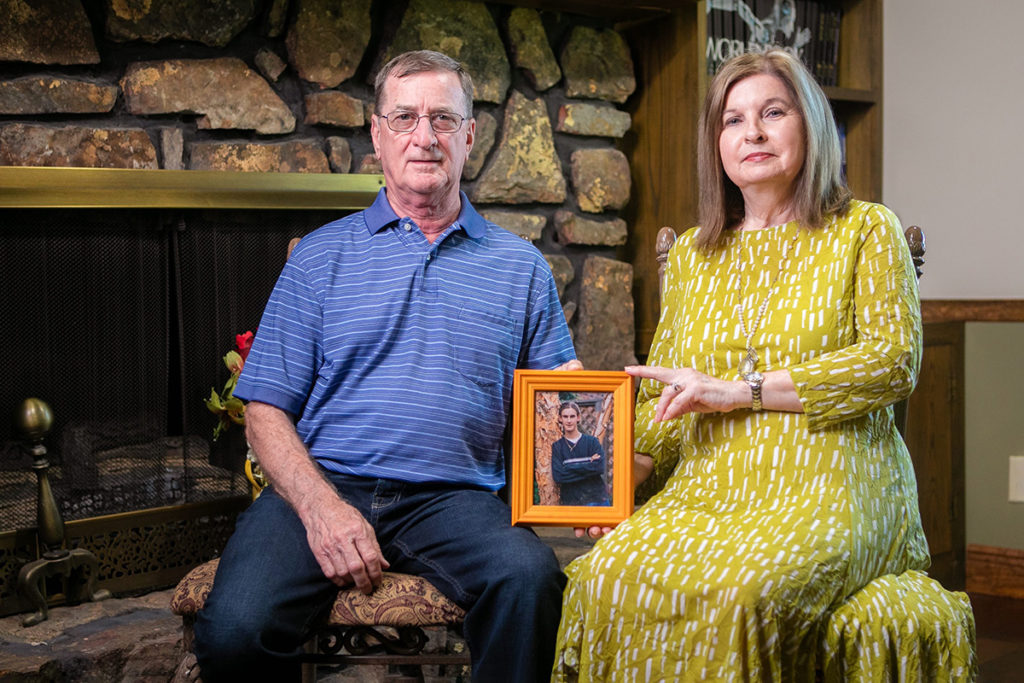George and Dianne Sellers received word in June 2021 that their son Brad had locked himself in his bedroom while threatening suicide. They called Weems Community Mental Health Center to request that someone meet them at Brad’s home and then rushed to the apartment complex. When George Sellers attempted to open the bedroom door, Brad slid a knife up through the door opening and sliced his father’s arm so severely that George needed medical attention.
Dianne drove her husband to the emergency room and then returned to the apartment, where Quitman, Miss., police had already arrived on the scene. Clarke County Sheriff Todd Kemp, who knew the Sellers family, happened to be near the complex when the Quitman Police Department radioed for backup.
Kemp began to coax Brad Sellers, whose schizophrenia had increasingly elevated his paranoia, into opening his bedroom door, WTOK reported. Once Sellers opened it enough to create an approximately 6-to-8-inch gap, Officer Thereasa Haire of the Quitman Police Department reached for the doorknob.
In reaction, Sellers reached out and slashed Haire’s arm to the bone, and she began to bleed profusely.
“Get out of here. Get out of here and get medical help,” Kemp instructed.
Haire ran out from the apartment to a Paratech Ambulance that was outside on standby. Deputy Bill Howell then kicked the door in and deployed his taser, after which he and Kemp leapt on top of Sellers in a matter of seconds. Police took Sellers into custody without further incident.
Haire’s wound required surgery in Meridian, and officers took Brad Sellers, 39 years old at the time, to Athens-Clarke County Jail, charging him with aggravated assault on a local police officer.
‘A Sad Situation’
“Just a sad situation how it all turned out—I felt like if I had gotten there first, it wouldn’t have happened like that,” Sheriff Kemp said after the event.
George Sellers said his son knows Kemp and seemed to trust him. “The sheriff had almost talked him out of that room, but when he saw someone he didn’t know behind him, that was the end of that,” he said.
“There were a lot of people there, which I felt was unnecessary,” Dianne Sellers added. “I knew we were not handling it right.”

The mother disclosed that the Clarke County Sheriff’s Department had two crisis-intervention team officers with whom her son was familiar, but neither was available when she called their cell numbers. CIT officers receive training to handle mental-health crises.
Asked if he had CIT officers on the scene, Quitman Police Chief Mike McCarra responded, “My officers have all kinds of training.” Brad Sellers’ attorney, Michael Grace of Quitman, Miss., did not return phone calls concerning his client’s case.
A psychiatrist Brad Sellers saw in December determined that he is incompetent to stand trial because of his schizophrenia but that treatment may restore him to competency. His mother, Dianne, said she was told her son faces a wait in jail of up to a year for a bed to open up at Mississippi State Hospital.
Sellers is among an unknown number of Mississippians awaiting a bed in the hospital’s forensic unit.
Waiting Inside Jail for Care, Trials
Laurel, Miss., native Raffell Franklin was locked inside the Jasper County Jail for five years without trial on a murder charge before civil-rights groups and Franklin’s family called Disability Rights Mississippi, a nonprofit with a federal mandate to protect and advocate for the rights of individuals with disabilities across the state. The callers wanted DRM to investigate the process the Mississippi Department of Mental Health uses to determine how long those held in county and city jails across the state who suffer from mental illness have to wait for beds.
Within 48 hours of DRM asking for information on his case, Franklin was transferred to Mississippi State Hospital in Whitfield, Miss., Litigation Director Greta Martin of DRM said.

The disability-rights organization, while investigating complaints of systemic understaffing at Mississippi’s state hospitals for the mentally ill, had already filed a lawsuit against the Department of Mental Health to obtain 30 days of incident reports, Martin said.
Responding to calls about Franklin’s case, the organization also requested information on how the department determines who goes to Mississippi State Hospital’s forensic unit from jails across the state—a request the department denied. DRM then filed another lawsuit against the department for refusing to answer its questions. The department has declined to comment about its decision.
“(Having that information) will help us keep this situation from happening again,” Martin said. “We think it’s going to be telling and show how they are bumbling this.”
Martin said DRM requests information regularly from the department to monitor care, services, grants and facilities—as well as information they need to investigate issues that need monitoring.
“I don’t understand the sudden reluctance,” Martin said.
Staffing Limitations at Forensic Unit
The Mississippi Department of Mental Health says the accused who are locked up should get treatment faster than those who are not. “Individuals who are awaiting admission in a jail are (generally a) much higher priority for admission than the individuals awaiting treatment who are out on bond,” DMH Communications Director Adam Moore said.
“The charges themselves are not a factor in admissions,” he added. “Infrequently, (Mississippi State Hospital) receives information that a particular individual awaiting admission in a jail has a more severe psychiatric or medical situation than usual, and that is taken into consideration when prioritizing admission.”
Moore noted that the wait is longer now than usual because the hospital can only staff 39 forensic beds. “These beds encompass pre-trial evaluation for competency, competency-restoration treatment, high-risk patients under civil commitment, and individuals found not guilty by reason of insanity,” Moore said.
“Staffing has been a particular challenge during the ongoing COVID-19 pandemic,” he added. The goal is to reach pre-pandemic staffing levels. … “If the hospital were fully staffed and the environmental issues were addressed in the currently occupied buildings, 57 forensic beds would be available.”

The department’s proposed renovation project for its forensic building would increase that capacity to 83 beds. “We anticipate a significant reduction in wait times and improved access to care for individuals awaiting treatment for competence restoration in Mississippi jails,” Moore said.
The renovation work is expected to last through the second quarter of calendar year 2023, although the COVID-19 pandemic could affect the time frame, he noted.
Determining Competency for Sellers
Brad Sellers’ journey through Mississippi-based mental-illness facilities has included stops at Clearview Recovery Center in Moselle, Pine Grove Behavioral Health in Hattiesburg, East Mississippi State Hospital in Meridian, Mississippi State Hospital in Whitfield and Westhaven Group Home in Jackson, along with a stint at Mississippi State Penitentiary in Parchman for a probation violation, Dianne Sellers said.
During various stages of his life, Brad Sellers lived at home with his parents. During his most recent tenure there, Weems Community Mental Health Center would send someone out to give him a shot once per month that helped treat his symptoms.
“That was a godsend,” Dianne Sellers recalled.
At one point, Brad lived in his grandfather’s old house and boarded up all the windows due to his paranoia, causing a lot of property damage. He had to leave there after police arrested him for breaking into a nearby house, which relatives owned, with another person.
“Brad went to jail, and the other guy didn’t.” his mother recounted. “He’s always been a follower, not a leader.”
At the time of his 2021 arrest, Brad Sellers was living rent-free in an apartment complex his parents owned. He had a roommate who was responsible for making sure he took his medication, but somewhere “that went to the wayside,” his mother said.
Usually, a defense attorney for a suspect charged with a crime raises competency issues, Matt Steffey, a Mississippi College School of Law professor, explained. But prosecutors and judges can also bring those matters to attention.
Competency can come into play at three stages of the court process—whether an individual was competent at the time of the crime, whether the defendant is competent to stand trial and whether the person is competent to understand the sentence.

Drug abuse can be a basis for an incompetence finding, Steffey said. Kemp said Brad Sellers had substance-abuse issues for most of his adult life.
Most competency issues are raised pre-trial, which often leads to cases like those of Brad Sellers and Raffell Franklin, where people considered a danger to themselves or others are jailed while awaiting commitment, Steffey said.
Many times, individuals with competency issues get the opportunity to make bail. “A person whose mental competency is in question has just as much right to bail unless and until the state makes a presentation that the person is a danger to themselves or others. Well, envision the alternative,” Steffey said.
“Aggravated assault against a police officer is a very, very, very serious matter,” Steffey noted.
Answers vary on whether competency can be restored, depending on individual cases, Steffey said.
Individuals are commonly treated for three to six months to see if they can be competent. Kemp said jail personnel are treating Brad Sellers in jail. He takes Risperidone—an antipsychotic—and Trazodone, which treats depression.
“Often the person languishes in jail with the explicit or implicit consent of the defense lawyer,” Steffey said.
It also matters whether the defendant could tell right from wrong at the time of the crime with the court determining whether Brad Sellers’ mental state was healthy enough for him to understand that his actions were criminal. “It’s a tough sell to a jury,” Steffey said.
Dianne Sellers said she understands wait times can be lengthy for those awaiting commitment because of the demand for beds and services. “To me, it’s sort of urgent,” she said. “They need more mental-health personnel to handle the backlogs of work that needs to be done.”
She does not believe she and her husband can continue caring for Brad themselves—they need help. “He needs a facility that can handle him,” she said.
The Mississippi Center for Investigative Reporting—a nonprofit news organization that seeks to inform, educate and empower Mississippians in their communities through the use of investigative journalism—produced this story, which the Mississippi Free Press edited for republication. Sign up for MCIR’s newsletter here.
Email Julie Whitehead at julie.whitehead.mcir@gmail.com.










